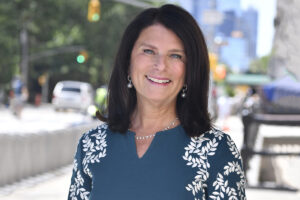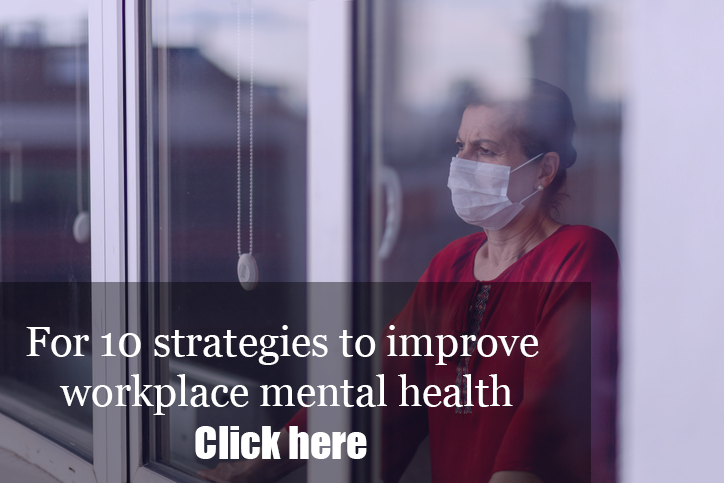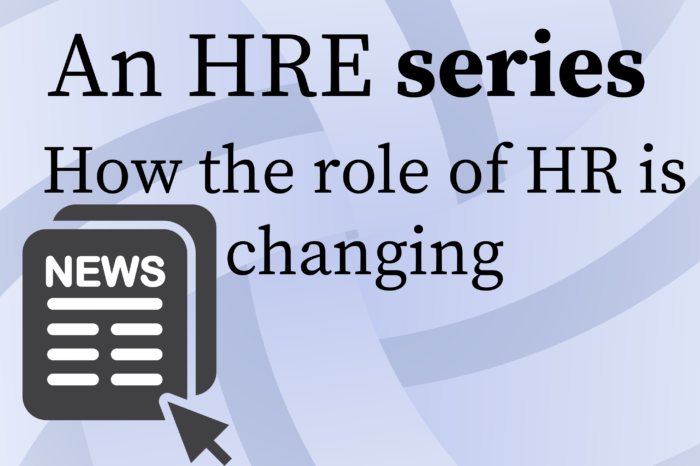Jump to:
- How Ellyn Shook overcame hardship
- Mental health and healthcare in the pandemic
- Equality in action at Accenture
Ellyn Shook is HRE’s 2020 HR Executive of the Year. (Photo by Dorothy Shi Studio)

When COVID-19 thrust the country into lockdown in March, Ellyn Shook was like many: overworked, tired, scared, stressed. But as chief leadership and human resources officer of professional services giant Accenture, her responsibilities were greater than most—working feverishly in her New York apartment to get hundreds of thousands of employees across the globe situated to work from home and figuring out what to do next. She had begun daily hourlong COVID-19 crisis meetings with other company executives, and she wasn’t sleeping or eating well. She also wasn’t making time for walking, which is her go-to way to destress.
“I was panicking. Schools had already shut down in China, schools had shut down in Italy and we were potentially facing it in the U.S. What were people going to do?” says Shook, who has worked in HR for Accenture since 1988 and became CHRO in 2014.
It was at that time that her mentor and business partner Arianna Huffington—Accenture was one of the first corporate partners of Thrive Global, Huffington’s wellness venture—called Shook to see how she was doing. “I’m working around the clock. We’re trying to make sure all our workers are safe,” Shook told her.
Register here: Join us for the HR Executive of the Year and HR Honor Roll Awards Ceremony
 Huffington offered advice that gave her important perspective: “ ‘Stop. Stop for a minute. Accenture is not going to look to you for stamina, Ellyn. Accenture is going to look for your empathy, for creativity and to solve very complex problems. You need to sleep and you need to walk,’ ” recalls Shook, who has been named HRE’s HR Executive of the Year for 2020 not only for her efforts in the past several months but for her long list of accomplishments at Accenture. Those include promoting gender equality, focusing on employee wellness and leading the firm’s more than $1 billion annual investment in employee development.
Huffington offered advice that gave her important perspective: “ ‘Stop. Stop for a minute. Accenture is not going to look to you for stamina, Ellyn. Accenture is going to look for your empathy, for creativity and to solve very complex problems. You need to sleep and you need to walk,’ ” recalls Shook, who has been named HRE’s HR Executive of the Year for 2020 not only for her efforts in the past several months but for her long list of accomplishments at Accenture. Those include promoting gender equality, focusing on employee wellness and leading the firm’s more than $1 billion annual investment in employee development.

Shook very literally heeded Huffington’s advice: Every day for the past several months, she has blocked off 5:45-7:30 p.m. in her calendar and walked between 4 and 7 miles. It’s an appointment she refuses to miss, walking in windstorms, in rain, in the blazing sun. On days she is in New York City, those walks are in Central Park. When she’s at her New Jersey home, she walks a giant loop in town and is often joined by her husband of 34 years, Pat.
She’ll listen to The New York Times news podcast, “The Daily.” She’ll talk to her husband about their life or their days or their family. And, yes, she’ll sometimes think about work: “Sometimes I do some of my most creative thinking during that time,” she says.
In a crisis that’s testing organizations—as well as CEOs and HR leaders—priorities are plenty: the safety and health of workers; driving employee engagement; the ever-changing technology required for the country’s largest-ever, and unplanned, experiment in remote work. But perhaps most important, the pandemic has reiterated the importance of mental wellness, of work/life balance, of self-care. It’s a lesson that drives Shook—not only for herself but for all of Accenture’s 513,000 employees.
“If you’re not comfortable practicing self-care, there’s no way you can be a leader in these times,” Shook said during a recent video call from her New Jersey home. “You really can’t. So I’m not shy about sharing those moments of self-care because I think they can help people grow.”
“If you’re not comfortable practicing self-care, there’s no way you can be a leader in these times.” Ellyn Shook, CHRO Accenture
Says Huffington: “It was clear [Accenture leaders] all had this incredible sense of responsibility and had this huge burden on their shoulders. It was about reframing: What was seen as a luxury and self-indulgent is actually an investment in herself that would make [Shook] a better leader. It’s fantastic to see the impact of [the walks] on her and her leadership.”
Although mental health has always been a priority for Shook, it took precedence in the pandemic—and for good reason: Three-quarters of employees say they are burnt out, prompted in part by pandemic-driven longer hours and intense stress. And depression risk for employees is up a whopping 102% for employees and 305% for employees aged 20-39 since the start of COVID-19, according to the most recent data from Total Brain.
 “Quite frankly, mental health issues coming out of this pandemic can create [their] own pandemic,” Shook says.
“Quite frankly, mental health issues coming out of this pandemic can create [their] own pandemic,” Shook says.
Shook worked with Huffington in March to launch Thriving Mind, a holistic mental wellbeing program developed in partnership with Thrive Global and research from Stanford Medicine, for all Accenture employees.
The e-learning course is designed to boost employees’ awareness of their unique stress responses and to help them take steps to recharge and improve their resilience and mental wellbeing. In less than two months, the program attracted more than 65,000 participants. “It had unprecedented engagement, more than anything else they had offered,” Huffington says. “A lot of companies are beginning to realize that’s how you change the culture, not just by checking a box.”
Changing the culture was indeed a priority for Shook when the pandemic hit.
[click_to_tweet tweet=”.@Accenture #CHRO and HR Executive of the Year @EllynJShook1 is responding to the many new priorities brought by the #coronavirus #pandemic with empathetic action” quote=”Share this story” theme=”style3″]
“Work/life balance is taking on a new meaning,” says Shook, who, as someone who spent the majority of her time traveling the world to visit employees, had her own adjusting to do when she began working from home full-time. “I started hearing vocabulary I didn’t like; I heard people saying, ‘I’m living at work’ instead of, ‘I work from home.’ It’s not a good mindset.”
In addition to Thriving Mind, Shook and Accenture tried to help by promoting wellness and support: giving people permission to be transparent about what they need, for instance—encouraging them to take walks or hang out with their kids. Accenture recently halted all Friday meetings so employees are more inclined to take time off.
These might sound superficial, Shook says, but they’re important: “It’s what creates the environment for people to be successful in a time when it’s very difficult to understand how you can be successful.”
Overcoming Hardship
Crisis is not new for Accenture or for Shook. In fact, this year of coronavirus and racial tensions following the death of George Floyd comes on the heels of another major challenge for the organization. In 2019, the firm suffered a blow when its CEO, Pierre Nanterme, stepped down in mid-January while battling colon cancer. Twenty days later, he died.
“The organization really suffered from that loss because he was highly charismatic; he had huge belief in our people,” Shook says. “He was such an inspiring human being.”

While Shook was personally devastated, she also knew she had to help employees work through their grief. It’s a role she took head-on, says Accenture CEO Julie Sweet, who assumed the position last July after a CEO search and succession process in which Shook played a big role. “Ellyn was at the core of understanding what people were going through, what we had to deliver as a company and how to communicate in a genuine, respectful way that will help people with their loss and inspire them to do what they needed to do.”
The ability to exhibit empathy and compassion while also acting as a business leader is a rare combination, Sweet says, but it’s vital to Shook’s success as CHRO. “I think of Ellyn as a great voice of our people, but also one of my strongest business leaders.”
Nanterme’s death did, in some ways, prepare Shook for the challenges this year has brought. Knowing the importance of preparing for inevitable losses during COVID-19, Accenture created a program that supports family members of colleagues who die. A group of employees in each country has been trained.
Shook is quick to say there’s no right way, or one way, to help employees through challenges—especially during a pandemic that’s wreaking havoc on nearly every issue: “With 513,000 employees in 51 countries, there’s not going to be something that will solve everyone’s problems,” she says. “So, we try to get feedback and input from our people.”
There are programs and initiatives designed to help, though, including:
- A new benefit through childcare provider Bright Horizons that aims to help Accenture’s working parents with distance learning;
- A new virtual onboarding program that has made new hires feel connected. The program includes digital interaction, team building activities, virtual learning and company swag sent to the employees’ homes; and
- Accenture’s online COVID-19 site, called #moretogethernow, which offers tools for everything from remote work to mental health to resources for parents juggling their jobs with the demands of their new “co-workers”—their children. The site was launched in a week, and in its first several days, attracted more than 30,000 page views and 23,000 unique visitors.

Working fast to create and launch programs was vital during the crisis—and it’s something Shook excels at, Sweet says. “She reminds us at the leadership table that progress is more important than perfection.”
Perhaps most significant to Shook, though, has been an effort to support the greater good and employees everywhere, not just Accenture’s workforce: People + Work Connect, an employer-to-employer initiative launched in April that connects employers laying off or furloughing workers with organizations in need of talent. The analytics-driven platform, built by Accenture pro bono, is free for employers and was the brainchild of Shook, alongside CHROs Lisa Buckingham of Lincoln Financial Group, Pat Wadors of ServiceNow and Christy Pambianchi of Verizon. The group helped take the idea to reality in just 14 business days.
Since launching with leading companies—Marriott, Nordstrom and Walmart among them—about 1,400 organizations across more than 90 countries have engaged in the process, with nearly 420,000 (open jobs and available people combined) on the platform.
“We felt we had an obligation as leaders to think really differently on how to solve this problem that was going to face society, which was mass unemployment,” Shook says.
While COVID-19 has been the biggest mountain for employers this year—and maybe ever—it’s hard to talk about 2020 without addressing racial injustice. After nationwide protests, employers across all industries have tried to find their footing; many released statements of support for racial equality.
It’s an important acknowledgment, but for Shook, diversity, inclusion and equality aren’t just buzzwords, but a mission with deeply personal roots. Shook’s father was superintendent of schools in Orange County, N.Y., and signed the integration orders for Black and white kids to go to school together in the district Shook attended. “He was an incredible activist and leader in racial and education equality, and that’s how I grew up,” she says. “He died a year before I got this job, and to carry forward his mission in this role is a privilege, a huge privilege.”
Shook, like Accenture, has been a vocal advocate for gender and racial equality and made it a priority to set public goals. For one, the company announced plans to achieve a gender-balanced workforce by 2025. Accenture is well on its way: Today, 45% of its employees are women. Currently, 49% of new hires are women, and more than 215,000 women are employed globally, up from 100,000 in 2013. Accenture, furthermore, is one of the very few companies with both a female CEO and CFO.
Now, Accenture hopes to do the same for racial equality. In early September, the firm released substantial new goals for strides in race equality and representation: It will increase the representation of Black workers to 12% from 9%; and the representation of Hispanic and Latinx people to 13% from 9.5%. It also pledged to more than double the number of managing directors from those groups and to launch new mandatory training to support workers in identifying and speaking up about racism.
The initiatives are not only a transparent display of action, they are vital to Accenture’s success, Shook says.
“When George Floyd was killed, we continued to learn things about our workforce,” she says. “We have an unwavering belief at Accenture that our diversity makes us smarter and more innovative. We want our people to be successful professionally and personally because, when that magic happens, it’s when you unlock the full potential of an organization. Race is a business issue.”
For her leadership across all these areas, it’s no surprise that Huffington describes Shook as “a pioneer, a visionary, an innovator” in equality, in wellness and in leadership. “Courage is the word that comes to mind [when I think of her],” Sweet adds. For her part, Shook is quick to credit her “ambitious, intelligent, compassionate, committed” HR team for much of the company’s, and her own, success. The team’s priority of keeping the workplace human in a digital world has only been accelerated by this year’s struggles. It’s a focus Shook thinks will last, even after the pandemic has passed.
“Empathy is important, but I really believe that compassion will likely be one of the most important leadership characteristics that emerges out of this time,” she says. “Empathy is one thing but being able to respond to it and act on the issues is critically important.”





